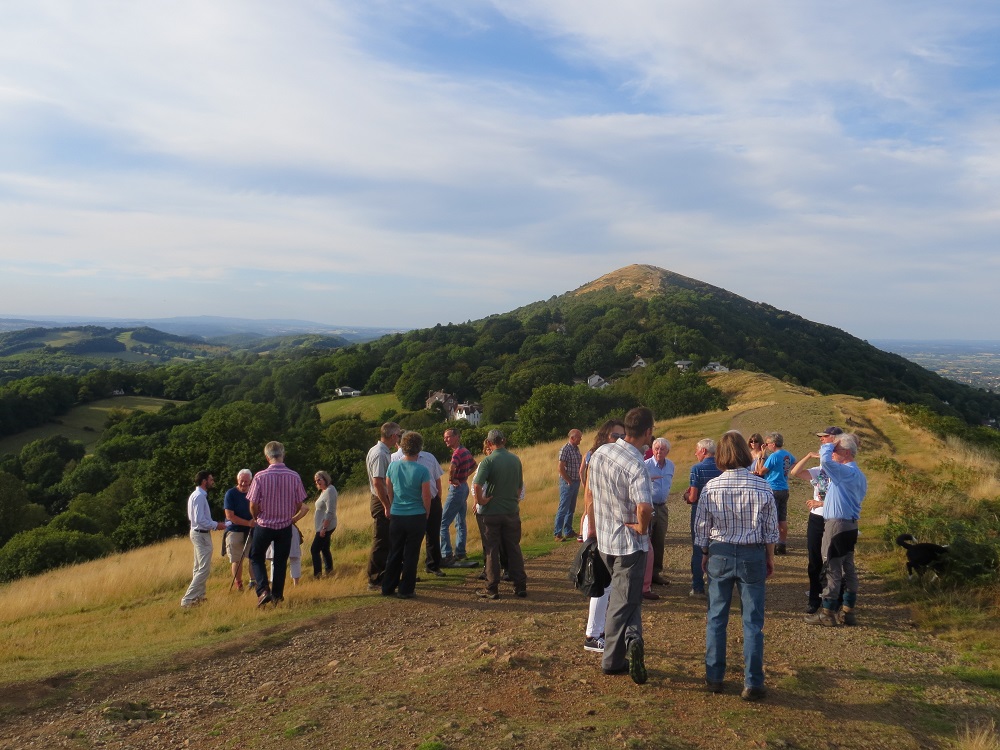The Malvern Hills Trust is the new working name of the Malvern Hills Conservators, a body that was first established by Act of Parliament in 1884 to protect and manage the Malvern Hills and the adjacent commons.
We are a registered charity (charity no 515804) with a governing Board and a team of Staff who together work to ensure the Hills are open for the public, whilst protecting this iconic landscape.
Our Vision
The Malvern Hills and Commons are a stunning, unique and inspiring landscape that is enjoyed and respected by everyone in harmony with rich and flourishing wildlife, natural and cultural heritage.
Our work
We manage approximately 1,200 hectares (3,000 acres) of open grassland, woodland and scrub across the Hills and Commons and we strive to manage this land for the benefit of wildlife, the commoners, the local community and the hundreds of thousands of people who visit the Hills each year.
Our key objectives (as mentioned in our Acts) are to:
- Preserve the natural aspect
- Protect and manage trees, shrubs, turf and other vegetation
- Prevent unlawful digging and quarrying
- Keep the Hills open, unenclosed and unbuilt on as open spaces for the recreation and enjoyment of the public
- Conserve and enhance biodiversity, Sites of Special Scientific Interest and Scheduled Ancient Monuments on its land.
Occasionally these objectives conflict, and where that happens we aim to find the most appropriate balance between them.
Malvern Hills Acts 1884 (PDF)
Malvern Hills Acts 1909 (PDF)
Malvern Hills Acts 1924 (PDF)
Malvern Hills Acts 1930 (PDF)
Malvern Hills Acts 1995 (PDF)
Who we are
The governing Board consists of 29 unpaid members and includes both elected and nominated members.
Eleven of the members are elected directly by the electorate in the parishes and wards that pay the precept. 17 are nominated by local authorities and one is nominated by the Church Commissioners
The Board meets at least five times a year, to consider the reports presented by its committees and officers, to set policies and strategic aims of the organisation and to address questions from the public.
All the Board and Committee meetings are open to the public, except where personnel matters or commercially sensitive matters are to be discussed or where legal professional privilege applies.
Members of the public may ask to make a short statement (maximum 3 minutes) at a Board or committee meeting. This request must be received no later than 12 noon, one clear day before the meeting (e.g. for a meeting on a Thursday evening, by 12 noon on Tuesday). The notice must state the subject matter concerned, and for a committee meeting, this has to be relevant to a matter on the agenda for the meeting.
Upcoming Board meetings
Board member profiles
How we work
The Board employs a team of staff under the management of the Chief Executive Officer and they undertake the day to day practical work. Staff are divided into four main teams - Administration, Conservation, Field Staff and the Wardens.
MHT has two key strategic documents that set out the Trust’s aims and objectives for the next 5 years;
- Our Business Plan 2016-2021 sets out the overall strategy and work programme for the development of all aspects of our organisation and its finances. The Business plan is split into three parts - Part A: Identifying Issues, Part B: Delivering Aims and Objectives, and Part C: Work Plan
- The Land Management Plan 2016-2021 sets out in detail the current and future management of the land that we look after, and in particular how we will protect the key aspects such as wildlife, public access, and archaeology.
In addition there is a set of Byelaws that covers all the land under our jurisdiction and these are policed and enforced by the Wardens and Chief Executive Officer.
Business Plan 2016-2021 Parts A and B (PDF)
Business Plan 2016-2021 Part C (PDF)
Land Management Plan 2021-2026
Staff profiles
View our Byelaws (PDF)
How we are funded
Approximately 60% of the cost of managing the land under our jurisdiction is met by a levy on Council Tax payers from the Wards of Malvern, together with the parishes of Colwall, Guarlford and Mathon. The rest of the costs are supported by income from car parking, grants from outside funding bodies, donations and other fundraising activities.
As a charity, donations and legacies are vitally important to us as they enable us to achieve more than just the basic maintenance work.
Our Annual Accounts contain further detail on our income and our spending on charitable objectives.





